SUSTAINABILITY REPORT
Tongaat Hulett is committed to sound principles of sustainable development being integrated into all aspects of its business activities, allowing it to create value for all stakeholders, with social, economic and environmental perspectives.
Tongaat Hulett’s key focus areas of sustainability include safety, health, environment, broad based black economic empowerment, human resources and skills development, talent management, employment equity, indigenisation and, where applicable, corporate social investment and stakeholder engagement.
With over 35 000 employees and notwithstanding Tongaat Hulett’s commitment to safety, tragically there were seven work-related fatalities in 2008. The company has introduced a step change safety plan which focuses on high risk areas, including the identification of high risk activities and additional interventions in order to minimise a recurrence of these types of incidents.
2008 sustainable development highlights include:
- Decrease in LTIFR (Lost Time Injury Frequency Rate) to 0,11 from 0,14 in 2007, constituting a significant improvement when compared to 1,27 in 2003
- A record level of 80% of South African based employees know their HIV and AIDS status
- Meaningful involvement of employees through the BEE Employee Share Ownership Plan (ESOP) and Management Share Ownership Plan (MSOP)
- The Ithuba Farming Project, an Enterprise Development initiative in maize farming which is fast becoming a national benchmark
- Increase in black employee representation at top management from 36% in 2007 to 39% in 2008
- Tongaat Hulett’s inclusion in the 2008 JSE’s Socially Responsible Investment (SRI) index for the fifth year in a row and being ranked among the 21 best performing companies on the JSE SRI Index
- Tongaat Hulett was the Mid Cap category winner at the Chartered Secretaries of Southern Africa’s Annual Report Awards in respect of “The benchmark for governance reporting in Africa”
- Being ranked first in the Food & Beverages sector of the Financial Mail’s Top Empowerment Companies 2008
- The Investment Analysts Society of Southern Africa voted Tongaat Hulett as the winner of the Best Reporting and Communication Award in the Consumer Products category
The company is committed to transparency, good governance and the promotion of sustainable development. This report comprises the sustainability outcomes of Tongaat Hulett’s South African, Swaziland, Mozambique and Zimbabwe operations for the year ended 31 December 2008.
SAFETY
Tongaat Hulett is striving to create a workplace free of fatalities and injuries. Substantial improvements continue to be achieved in safety performance at all operations, with a decrease in LTIFR from 0,14 in 2007 to 0,11 in 2008, constituting a significant improvement when compared to 1,27 in 2003. LTIFR is the number of lost time injuries per 200 000 hours worked and includes all restricted work cases. The greatest progress was experienced in starch where the LTIFR reduced to 0,28 in 2008 from 0,66 in 2007. The R25 million spent in 2007 on new safety personnel carriers at sugar operations made a significant contribution to the improvement of safety performance.
Regrettably the company recorded seven fatalities. Two occurred in South Africa at the Felixton and Darnall sugar mills. Two occurred at Triangle in Zimbabwe and three occurred in Mozambique, two at Mafambisse and one at Xinavane.
| Actual 2006 | Actual 2007 | Actual 2008 | Targets 2009 | |||||
|---|---|---|---|---|---|---|---|---|
| No. of LTI’s | LTIFR | No. of LTI’s | LTIFR | No. of LTI’s | LTIFR | No. of LTI’s | LTIFR | |
| Sugar | 66 | 0,18 | 62 | 0,13 | 53 | 0,10 | 40 | 0,09 |
| Starch | 6 | 0,44 | 9 | 0,66 | 4 | 0,28 | 3 | 0,21 |
| Developments | 0 | 0,00 | 0 | 0,00 | 0 | 0,00 | 0 | 0,00 |
| Consolidated | 72 | 0,19 | 71 | 0,14 | 57 | 0,11 | 43 | 0,09 |
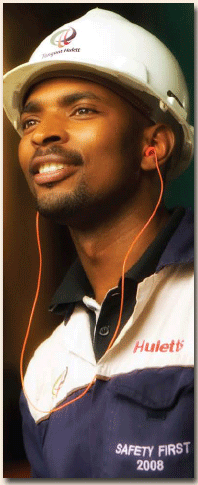
These fatalities were rigorously investigated and in accordance with standard practice, the findings have been widely disseminated throughout the company to increase awareness. Following interactive workshops lead by the Chief Executive Officer (CEO), a step change safety plan focusing on high risk areas has been introduced, which includes the identification of high risk activities and further interventions to eliminate or minimise the possibility of a fatality in the event of an incident occurring. This intervention is aimed at re-energising Tongaat Hulett’s approach to safety and to create a turnaround culture throughout the organisation.
A mind-mapping software tool is being used to provide a helicopter view of each operation’s safety programme and to facilitate the tracking of progress on a regular basis. The Tongaat Hulett Safety Improvement Plan includes the following key elements at each operation: step change safety plan focusing on high risk areas, management actions including involvement and ownership, accreditation, selection and management of contractors, accident/ incident investigations, workforce training and involvement, supervisor interactions, safety, health and environment (SHE) practitioners, community interaction and safety statistics.
It is planned to progressively improve the safety target every year with the aim of achieving an LTIFR below 0,08 by 2010. Safety statistics since 2006 and targets for 2009 are contained in the table opposite.
Executive SHE committees have been established in South Africa, Mozambique, Swaziland and Zimbabwe. These committees are chaired by the CEO and meet quarterly to review progress of the Tongaat Hulett safety management programme. All operations continue to identify and reevaluate their risks. Active monitoring, control and action are ongoing.
Underpinning the Safety Improvement Plan, all operations have programmes in place related to behaviour based safety, visible felt leadership, hazard identification and risk assessments, internal audits, management reviews and third party audits. Golden rules, standard procedures and safety training are key components of the safety improvement drive. Senior employees in operational areas are expected to ensure compliance with safety laws and remain responsible for taking steps considered to be practicable to mitigate any potential hazards.
Proactive safety culture transformation processes commonly referred to as behaviour based initiatives are in place in all operations, which are aimed at transforming at-risk behaviour to a work culture with a high level of safety responsibility and accountability. Tongaat Hulett is well advanced in the implementation of behaviour based safety programmes. The programme includes the establishment of steering committees, completion of a perception survey, site assessments and the appointment of champions, coaches and assessors. This programme is a long-term process where involvement and commitment at all levels of the business is required.
Management is committed to demonstrating visible leadership in safety, health and environmental issues. Senior managers inspect the scene where fatalities, lost time injuries and other safety related incidents have occurred and participate fully in thorough investigations and actions to prevent a recurrence. Management’s visible involvement in assessing compliance with SHE rules, standards and procedures on the shop floor has been increased. Actions include internal and external SHE audits, safe behaviour reinforcement, corrective and development coaching, planned job observations, job safety analysis and critical task identification.
In accordance with the relevant risk assessment processes, high impact SHE risks have been identified and assessed on a company wide basis. The risks are rated and evaluated, with contingency plans in place to address and mitigate significant risks. The identified risks include areas such as motorised transport, fire, explosion, air emissions, noise, HIV and AIDS.
Benchmarking is used to measure standards against leading best practice. Relevant information and experience is shared across all operations and Tongaat Hulett SHE committee meetings are used as one of the vehicles to promote the implementation of leading practices and shared learning. Inter-operational site visits form an integral part of the shared learning process whereby management teams have the opportunity to gain first hand information on SHE practices and access to innovative ideas. Incident learnings are also shared across the company.
HEALTH
All South African operations comply with the requirements of the Occupational Health and Safety Act, or the country equivalent in the other countries. The company is committed to exceeding the minimum requirements of the legislation. SHE audits are conducted regularly. Occupational and primary health care programmes are provided at company clinics, first aid centres and at the high quality company hospital in Zimbabwe. Health care programmes include risk assessment and control measures, hygiene surveys and medical surveillance. Management in each of the operations is required to ensure that all legal requirements are complied with, and where legislation does not exist, leading practices identified and implemented.
HIV and AIDS
In recognition of our responsibility towards managing HIV and AIDS, there is a Board approved HIV and AIDS policy, which encourages training and education, voluntary counselling and testing, and ensures the fair, compassionate and non-discriminatory treatment of those who may be affected by the disease.
Holistic and comprehensive HIV and AIDS management programmes are in place with the key elements being awareness, prevention, encouraging employees to know their status through Voluntary Counselling and Testing (VCT) treatment that includes Anti-retroviral Treatment (ART), care and support. Due to the requirements of confidentiality and privacy, as well as medical and clinical expertise when treating HIV and AIDS patients, the company makes use of external service providers in certain operations to co-manage the workplace programmes. Where appropriate, successful wellness programmes and medical surveillance are offered in various operations. The key components of these wellness programmes include healthy lifestyle education and personal health assessment, including VCT.

Good progress is being made with the number of employees knowing their HIV status. 80% of the employees in South Africa, 70% in Swaziland, 65% in Mozambique and 69% in Zimbabwe know their status. In Mozambique, progress continues to be made in respect of HIV and AIDS programmes including VCT in conjunction with the Government of Mozambique. Strategies to ensure a further increase in the number of employees participating in VCT are in place, such as linking VCT to occupational medical surveillance programmes, general wellness programmes and HIV and AIDS commemorative events such as World AIDS Day. By 2009 more than 81% of the employees in South Africa and 75% of the employees in the other countries should know their status.
The company’s ART programme is progressing favourably with 1 767 employees (136 in South Africa, 489 in Mozambique, 95 in Swaziland and 1 047 in Zimbabwe) currently receiving ART.
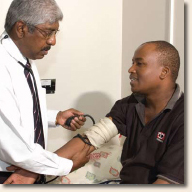

Number of employees on Anti-retroviral Treatment
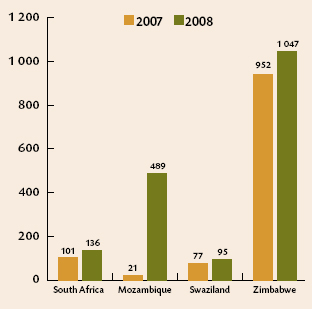
Occupational Diseases
Ongoing occupational health programmes are in place at all operating centres to eliminate priority health risks such as noise induced hearing loss and occupational diseases such as asthma and dermatitis. Risk assessments, hygiene surveys, risk control measures, medical surveillance and audits are conducted periodically to address exposures to health hazards at the workplace. Further occupational health audits are planned for 2009, building on the solid platform that has been established.
Malaria
Malaria is still a significant health risk in the Mozambique, Swaziland and Zimbabwe operations. Integrated malaria control programmes to mitigate the impact of the disease are in place at the respective operating centres. The key elements of the programmes are vector control with insecticides, prevention of mosquito bites with personal protective measures and the treatment of established cases of malaria. The number of malaria cases amongst employees in 2008 was 1 621, with 1 011 cases reported in Mozambique, 1 in Swaziland and 609 in Zimbabwe. In 2007 there was a total of 1 003 cases, with 751 cases reported in Mozambique, 1 in Swaziland and 251 in Zimbabwe.
ENVIRONMENT
Tongaat Hulett seeks to responsibly manage the impact on natural resources and reduce waste generation. Research is regularly undertaken to measure and monitor the impact of its operations on the environment and implement systems to ensure that resources are used in a sustainable manner.
Policies and practices are in place in South Africa, Zimbabwe, Mozambique and Swaziland to ensure operations are managed within statutory and legal parameters, as well as within self-imposed targets. In Mozambique, policies are being developed in line with local standards or in advance of local standards where these are deemed inappropriate.
Key environmental risks have been identified and appropriate action is being taken to either eliminate or minimise the risks concerned. Environmental incidents and complaints are well monitored, reported and acted upon. Significant progress has been made during 2008 with the recording of environmental data on emissions, energy consumption, waste quantification and resource conservation. Specific targets have been set at each operation and are being aligned to the ISO 14001, OHSAS 18001 and NOSA requirements. Objectives and targets will facilitate meaningful progress with regard to best practice in sustainable development. The achievement of objectives and targets is monitored by external auditors and all operations are within the permitted legal specifications. Operational targets have been set in respect of primary water use, energy use, greenhouse gas emissions, air quality (sulphur dioxide emissions), land use and bio-diversity.
Tongaat Hulett’s approach to property development is conceptualised and implemented around a sustainable development philosophy which, at its core, is aimed at achieving an appropriate synthesis between economic development, environmental enhancement and social upliftment. Actions continue to be taken to find ways of addressing social development objectives such as affordable and quality housing, appropriate densification and public transport, as well as environmental sustainability measures such as reducing energy and water usage and developing ecological corridors and indigenous carbon sinks.
The undertaking of Environmental Impact Assessments (EIA’s) and implementation of the respective Environmental Management Plans (EMP’s) are entrenched and all operations strive to conduct themselves in an environmentally responsible manner.
Climate Change
Tongaat Hulett’s sugar mills are fuelled, during the 8-month sugar milling season, on bagasse (sugar cane residue) and renewable fuel, resulting in the company’s operations having a small carbon footprint. Notwithstanding this, the company continues to implement a number of initiatives and projects to positively manage the impact of the carbon footprint and greenhouse gas emissions from the operations. These include the continued drive to convert from the use of coal to natural gas where appropriate, and improving plant and boiler efficiencies to reduce coal consumption. With the growing global drive to address the issue of carbon emissions and global warming on a more urgent basis, Tongaat Hulett is continuing to investigate a number of avenues which will positively reduce the impact of the carbon footprint, including further use of natural gas for steam generation, cogeneration of electricity from natural gas in the starch operations and the expanded production of electricity from sugar cane bagasse. The company is also investigating the production of bio-fuels from a number of feedstocks and at different geographic locations.
Air Quality
Since sugar mills burn bagasse as a fuel, the flue gases from the boilers do not contain harmful levels of contaminants. Wet scrubbing technology is used to remove fly-ash from the flue gas to ensure that emissions meet the required standard.
The central sugar refinery in the Durban South Industrial Basin burns coal as a boiler fuel and therefore has a greater challenge in terms of emission reduction. Relevant environmental authorities are consulted on a regular basis. A capital project has been implemented over the last two years to refurbish the boilers, thus improving their efficiencies and reducing emissions. In addition, a new flue gas scrubbing plant was commissioned during 2008.
Energy
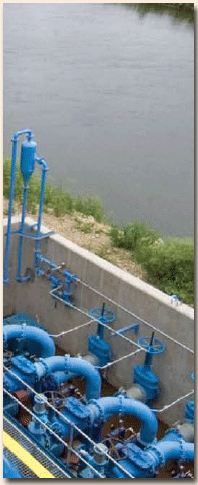
The process of energy production as part of sugar manufacture has a net positive greenhouse impact. The sugar cane plant represents a fully renewable energy source, since its biomass is generated in the field via uptake and conversion of carbon dioxide. Energy consumed, and therefore carbon dioxide released, by sugar factories is obtained by burning the fibrous residue of the sugar cane plant, commonly referred to as bagasse. Bagasse is burnt as a fuel in boilers to produce steam and generate electricity for the sugar mills, making them largely self-sufficient in energy terms and reducing dependence on fossil fuels. Coal is used as a primary fuel at the central refinery, which does not have a bagasse fuel source. A small amount of coal is burnt as a supplementary fuel at the sugar mills. Tongaat Hulett’s sugar mills routinely generate renewable electricity for sale into the national grid. Two of the mills sell this electricity to a “green” electricity trader, for resale as certified renewable electricity to consumers. Discussions are under way with national Government, renewable electricity traders and end users to facilitate a market for large-scale cogeneration of renewable electricity by the sugar industry.
Following the conversion in 2007 of the gluten feed dryer and a boiler to operate on gas at the Germiston starch mill, there continues to be significant reduced emissions from the mill. With the escalating price of coal, further investigations are underway to explore greater use of gas. Energy usage is continuously measured and monitored and process efficiencies are linked to continuous improvement targets. A co-ordinated program is in progress to maximise energy efficiency at Tongaat Hulett’s South African sugar mills and refinery, and site-based task teams have been set up to execute projects to this end.
Water Conservation
The sugar cane plant comprises 70 percent water and sugar mills are therefore net producers of water. Water is consumed in various forms, with the largest user being the agricultural operations. Most of the sugar cane processed in South Africa is dryland cane, which is dependent on natural rainfall, although a proportion is irrigated. In Mozambique, Swaziland and Zimbabwe, large-scale irrigation is practised via purpose-built canal systems with water extracted from rivers. The management of these canals and irrigation systems is in keeping with the highest agronomy and safety standards. At Tongaat Hulett Starch, water usage is monitored on a daily basis and optimised to run at world standards for wet milling. Water quality is monitored on an ongoing basis at all operations.
Efluent
Subsequent to the “zero effluent” philosophy that has been adopted by several operations to minimise the quantity of liquid effluent leaving each mill or plant, the sugar mills recycle and re-use water within the factory, while the remaining effluent undergoes biological treatment (aerobic and anaerobic) to reduce its chemical oxygen demand to acceptable levels before discharge. Water that is produced as part of the sugar milling process is used for the irrigation of sugar cane on adjacent estates. Effluent produced at the central sugar refinery is disposed of into the municipal sewer for treatment, and both the quantity and quality thereof is monitored carefully to ensure compliance with the relevant specification.
The starch operations’ effluent is treated at local authority treatment plants, with effluent quality being constantly monitored.
Waste
Some operations have re-engineered and refined services to reduce waste and increase resource productivity over the last few years. These initiatives have yielded significant savings, offering new revenue streams from the sale, exchange and recycling of by-products. Specific projects in 2008 included the quantification of waste streams and the establishment of waste recycling programmes.
Food Safety
Tongaat Hulett continues to manage its maize requirements on a non-genetically modified basis using a sophisticated identity preservation system. This ensures the company’s ability to meet the needs of its customers in the food industry. In addition, ongoing attention is paid to the requirements of ISO 9001, the Hazard Analysis Critical Control Point system (HACCP) and ISO 22000, in terms of quality and food safety standards.
Environmental Compliance
There were no material incidents, fines or non-monetary sanctions for non-compliance with applicable environmental regulations during the year under review. The established community liaison forums between Tongaat Hulett and interested parties continue to address environmental related complaints. In 2008, 50 complaints were received, down from the 113 received in 2007.
THIRD PARTY CERTIFICATIONS
All operating companies have embarked on programmes to conduct third party audits and/or certifications. In this regard, targets have been set for third party audits and certifications associated with NOSA, OHSAS 18001, ISO 14001, ISO 9001 and HACCP/GMP. All South African operations are certified under the ISO 14001 Environmental Management Systems. All sugar operations were audited by NOSA on the integrated star rating system. All starch operations are ISO 9001 certified and also ISO 14001 certified. Germiston is OHSAS 18001 certified. During 2008, Kliprivier and Meyerton mills had their OHSAS 18001 certifications suspended due to non-compliance in respect of zoning in dusty environments for electrical motors. The mills are aiming for re-certification during the second quarter of 2009. Mozambique and Zimbabwe operations have completed stage 1 of the ISO 14001. The Swaziland operation is certified to ISO 14001, ISO 9001 and NOSA. Certain of the starch and sugar operations have embarked on HACCP/ ISO 22000 food security assessments, with the objective of being certified in 2009.
TALENT MANAGEMENT AND PEOPLE DEVELOPMENT
To achieve superior performance which is key to success in a challenging business environment, skilled staff of the highest calibre are required. A shortage of skilled people, particularly in technical and engineering disciplines, has resulted in Tongaat Hulett experiencing major challenges in order to recruit, develop and retain key skills, in a fiercely competitive environment for scarce talent. There is a need to ensure an appropriate pipeline of skilled people to meet future skills requirements and for succession planning purposes. Programmes are in place at all operations to attract, develop and retain valuable skills. Targeted recruitment and market-related remuneration practices, coupled with effective performance and talent management, play an integral part in this regard. Innovative strategies are being used to retain people with key skills at the Zimbabwe operations, where challenging circumstances prevail.
Training related information in respect of the South African operations is as follows:
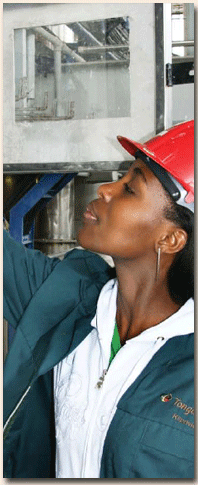
- Total training spend
- 1% skills levy
- Training spend % leviable amount
- Number of people days trained
- Number of people days available
- % trained people days
| R18,8m | |
| R7,4m | |
| 2,5% | |
| 10 716 | |
| 1 238 090 | |
| 0,9% |
Recruitment strategies are being improved, including the use of psychometric assessments and web-based recruitment linked to Career Junction. Partnerships and relationships with education institutions have been strengthened with institutions such as the University of Witwatersrand (Wits) (Electrical Engineering / Process Control), the University of KwaZulu-Natal, Mangosuthu Technikon and the Durban University of Technology.
Existing Skills
| Number | Average Age |
Number Terminated |
Number Appointed |
|
| Graduates/Diplomates | 531 | 36 | 54 | 47 |
| Artisans | 236 | 43 | 31 | 37 |
In the sugar operations, managers attend leadership and management development programmes offered by Treetops. The starch operations have formed a partnership with the Wits Business School and Maccauvlei to address their unique requirements of management development and supervisory training respectively. In addition to formal training and development programmes, there has been further improvement in performance management, talent management, coaching and mentoring processes. Coaching skills training is done through Wits Business School and UCT Business School. Where appropriate, reasonable accommodation of work/life balance, for example in the form of flexible work arrangements, is being used as one of the ways to accommodate the needs of particular employees, which would contribute to the retention of talent.
Bursaries, scholarships, trainee programmes and learnerships continue to be sponsored by the company to assist with sourcing and developing bright young minds in anticipation of future skills requirements. To support these programmes, strong partnerships have been formed with select educational institutions and Sector Education and Training Authorities (SETAs). Workplace skills, plans and implementation reports are submitted to the relevant SETA on an annual basis. The number of learnerships has increased to 137, which include in-service trainees, apprentices, engineers-in-training and technical learners. More than 1 704 employees participated in training programmes during 2008 and 101 employees participated in the company’s study aid scheme, which is aimed at assisting employees with part time tertiary education. Twelve bursaries for tertiary education (degree or diploma) are currently being sponsored by the company, and 86 apprentices are being trained.
Appropriate organisational transformation that contributes to Tongaat Hulett being managed as one company is encouraged, less hierarchical in its approach, with functionality being based on expertise instead of hierarchy. In addition, multi-skilling and multiple relationships are also encouraged. Task based processes, dynamism, decentralisation, growth, results-orientation, indigenisation, innovation and sustainability are being reinforced. In addition, an organisational climate is being nurtured to unlock the emotional energy and commitment of employees, to assist in building Tongaat Hulett as an employer of choice.
Intellectual Property
Tongaat Hulett’s intellectual property is protected through employment contracts and confidentiality agreements and/or license agreements with external parties. These agreements establish ownership of and rights to trademarks, copyright, trade secrets, innovations and inventions resulting from any dealings with the company. In the sugar operation, a portfolio of patents is managed by a knowledge management specialist in consultation with patent attorneys. Protection of patentable ideas is achieved by immediately taking out provisional patents, with targeted national and international patenting.
BROAD BASED BLACK ECONOMIC EMPOWERMENT
Tongaat Hulett continues to make good progress by building on its proud history of numerous meaningful and sustainable broad based Black Economic Empowerment (BBBEE) initiatives for the benefit of all stakeholders. Steps continue to be taken to ensure that processes and measurements within the company are aligned with the relevant regulatory requirements and the South African Department of Trade and Industry’s (DTI) Codes of Good Practice. Where applicable, operations have been involved in the formulation of relevant industry/sector scorecards.
Transformation, equal opportunity, the creation of a diverse employee profile and indigenisation remain key performance areas in every geographical region where Tongaat Hulett operates.
Tongaat Hulett established the ESOP and MSOP employee ownership schemes for the benefit of all South African black employees and senior black management respectively, effectively placing a collective interest of 7% in the hands of such employees. The overall objective of the schemes is to retain and attract high calibre black employees at every level of the business and to create a sense of ownership amongst employees, as well as to engender an ownership culture within the greater Tongaat Hulett workforce. The introduction of BBBEE equity participation in 2007, included an 18% participation by two BBBEE groupings, Ayavuna Women’s Investments, as an anchor partner, combining with the Mphakathi Trust, which benefits the communities surrounding the Tongaat Hulett property developments and Sangena Investments, as an anchor partner, combining with the Masithuthukisane Trust, which benefits the small scale cane grower communities surrounding Tongaat Hulett’s four South African sugar mills.
The second BBBEE rating audit by the National Empowerment Rating Agency (NERA) was conducted in 2008 with Tongaat Hulett being categorised as a Level Four Contributor, with an overall score of 70,38% compared to the previous year’s score of 75,16%. The detailed comparative scorecards are shown below:
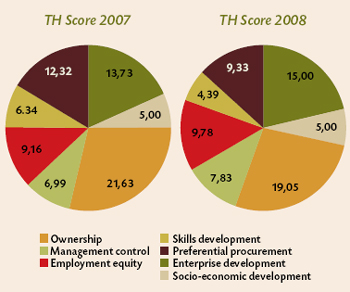
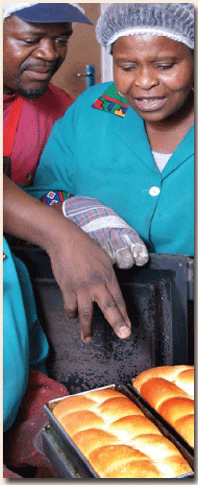
This means that entities purchasing from Tongaat Hulett may recognise 100% of the value of their Tongaat Hulett purchases in the procurement element of their scorecards. Going forward, reporting systems and targets will continue to be reviewed to ensure maximum alignment with the elements of the DTI Codes of Good Practice. The highlight of the accreditation is the improvement in enterprise development, management control and employment equity. The reduction in the ownership score is as a result of the movement in the Tongaat Hulett share price. This effect will reverse as the share price improves. The preferential procurement score reduced mainly as a result of a change in respect of the sampling process, following legislative amendments related to spend with black owned suppliers, particularly black cane growers. The reduction in the score for the skills development element was a consequence of the company’s leviable amount being higher than the previous year.
Management will continue to work towards the improvement of scorecard points where possible. Tongaat Hulett believes that BBBEE is essential to the sustainability of its South African operations, as well as the prosperity of South Africa and its people.
Employment Equity and Indigenisation
Tongaat Hulett values the dimensions that a diverse human resource base brings to its businesses. Employees in the Swaziland and Zimbabwe operations consist almost exclusively of local citizens. Mozambique continues to experience a skills shortage, as a result of which more foreign nationals are employed in that country than might be expected. Plans are being developed to employ and train local citizens to gradually replace foreign nationals in Mozambique.
In South Africa, where there is a particular need to address the imbalances of the past, a strong employment equity culture has been fostered over many years. Actions are continuing to improve the representation of designated groups, with particular emphasis on Africans, black women and persons with disabilities, with the intention to align the workforce profile with the underlying demographics of the country. Currently, 53% of management and 78% of skilled and supervisory positions are filled by black employees. Within the South African operations, 66,1% of the 531 graduates and diplomate employees are black, with women constituting 38,4%.
It is planned to review the employment equity goals that have been set for December 2010 and revised employment equity plans and strategies will be implemented to ensure that the restated goals are met. These plans will continue to include targeted recruitment and placement, coupled with talent and performance management, training and development, coaching and mentoring and managing cultural diversity. Increasing the representation of Africans and black females remains a challenge and concerted efforts will continue to improve performance in this area. Recommendations have been received from the Department of Labour (DoL), following their review of the Tongaat Hulett employment equity practices. Steps are being taken to implement the recommendations. The table below reflects the employee profile of the company’s South African operations, which was part of the Tongaat Hulett report submitted to the DoL in May 2008.
As at 31 December 2008, the proportion of black females in top management was 17,4% compared to 16,0% in 2007 whilst black females in management increased from 14,7% to 15,6%. There were 48 employees with disabilities, which constituted 0,9% of the employee complement.
| 2006 | 2007 | 2008 | |
| Top management | 25% | 36% | 39% |
| Senior management | 40% | 42% | 45% |
| Middle management | 53% | 55% | 60% |
| Skilled and supervisory | 76% | 77% | 78% |
The overall proportion of blacks in management as at 31 December 2008 was 52,8% of permanent staff at this level,compared to 50,2 % in the previous year. It is envisaged that by 2011, black representation at management level (D band and above) will exceed 59%. The above table reflects a year on year comparison of black employee representation in proportion to permanent staff at various levels as at 31 December 2008.
Employment Profile as at 31 May 2008 submitted to the Department of Labour
| Occupational Levels | Designated | Non-designated | TOTAL | |||||||||
| Male | Female | *Total | White Male |
Foreign Nationals |
||||||||
| A | C | I | A | C | I | W | A, C, I | W | Male | Female | ||
| Top management | 4 | 0 | 2 | 2 | 1 | 1 | 0 | 10 | 13 | 1 | 0 | 24 |
| Senior management | 20 | 4 | 20 | 2 | 1 | 5 | 3 | 52 | 65 | 2 | 0 | 122 |
| Professionally qualified and experienced specialists and mid-management | 55 | 8 | 43 | 26 | 3 | 18 | 29 | 153 | 79 | 4 | 4 | 269 |
| Skilled technical and academically qualified workers, junior management, supervisors, foremen, and superintendents | 332 | 62 | 235 | 132 | 19 | 55 | 70 | 835 | 154 | 5 | 3 | 1 067 |
| Semi-skilled and discretionary decision making | 974 | 19 | 200 | 153 | 6 | 26 | 13 | 1 378 | 4 | 1 | 0 | 1 396 |
| Unskilled and defined decision making | 1 303 | 2 | 15 | 498 | 0 | 2 | 0 | 1 820 | 2 | 1 | 0 | 1 823 |
| TOTAL PERMANENT | 2 688 | 95 | 515 | 813 | 30 | 107 | 115 | 4 248 | 317 | 14 | 7 | 4 701 |
| Non–permanent employees | 89 | 1 | 0 | 50 | 0 | 1 | 1 | 141 | 1 | 0 | 0 | 143 |
| GRAND TOTAL | 2 777 | 96 | 515 | 863 | 30 | 108 | 116 | 4 389 | 318 | 14 | 7 | 4 844 |
| Note: A = African C = Coloured I = Indian W = White *The column headed “Total A,C,I” has been added for clarity | ||||||||||||
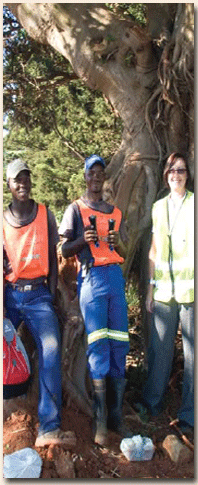
Labour Relations
The company has always maintained a constructive relationship with unions and a general climate of industrial peace has prevailed over the past few years. There are recognition agreements with 12 different unions and
approximately 67% of permanent employees are members of unions. Senior management are involved in union negotiations, with senior human resources staff playing a key role in this regard.
Disciplinary codes and procedures have been implemented after negotiations with unions concerned. One minor work stoppage of short duration, involving a small number of employees with minimal cost impact occurred during the year.
Preferential Procurement
The objective of Preferential Procurement under the DTI’s current Codes of Good Practice includes the promotion of BEE compliance by all entities and targets for procurement from Exempted Micro Enterprises (EME’s), Qualified Small Enterprises (QSE’s), black-owned and black women owned enterprises. Furthermore, with enhanced recognition given for Preferential Procurement from value adding suppliers and enterprise development beneficiaries, the procurement of locally produced goods and services is actively supported to assist in developing sustainable income streams for such new entities thereby.
In respect of the Procurement Scorecard for Tongaat Hulett and based on 2007 expenditure, out of a total available spend (defined as total procurement spend less spend on parastatals and the importation of goods not locally produced) of R3,973 billion, BEE procurement spend from all suppliers based on BEE procurement recognition levels as a percentage of total measured spend was R1,42 billion (35,7%).
Spend with companies which are more than 50% black owned totalled R307 million, whilst spend with QSE’s or EME’s totalled R306 million. The spend with companies which are more than 30% owned by black women was R4 million.
Enterprise Development and Transformation in Agriculture
Tongaat Hulett believes that enterprise development and transformation in agriculture are some of the most powerful vehicles avaliable to the company to contribute to nation building, transformation and BBBEE. Enterprise development has occurred, for example, through the sale of businesses to new black shareholders. Major BEE transactions concluded by the company include the listing and unbundling of Hulamin with a BBBEE equity participation element, the sale of Corobrik Klerksdorp Brick Factory and Supervision Food Services.
Tongaat Hulett has identified transformation of the agricultural sector in the countries within which it operates as a key imperative for long-term sustainable growth. Building on the strong platform which was established through the sale of some 11 871 hectares of Tongaat Hulett sugar cane land to 98 BEE medium scale farmers in South Africa since the commencement of the sugar operation’s programme in 1995 to transfer sugar cane farming skills and farms to previously disadvantaged emergent farmers, the company has implemented a number of models, which vary from country to country.
This land redistribution programme forms a major component of the company’s Enterprise Development Programme and is supported by the South African Department of Agriculture, the Department of Land Affairs and the Sugar Industry. The sale of farms to medium scale farmers equates to about 50 percent of the company’s land holdings in South Africa, compared to the Government’s target of 30 percent for transfer to black farmers by 2015. The focus in South Africa has been on the post settlement aspect of the land reform process for sugar cane land supplying its mills. This entails working with the claimant communities in order to assist them with business management and the development of successful farming practices, both during the transitional period prior to the settlement of the claim and once the claimant community have taken ownership of the land. In addition to the mentoring and support services provided to emergent farmers, Tongaat Hulett Sugar plays a leading role in the land reform initiative (Inkezo) of the South African Sugar Industry.
The Zimbabwe operations have been working with more than 500 outgrowers in order to rehabilitate cane supply to its mills. With Euro 45 million of EU funding being made available for the process, management will be focusing on the re-establishment of cane and the improvement of yields, from the current average of 30 tons cane per hectare to an excess of 100 tons cane per hectare. During the course of the Mozambique expansion project, the company identified an opportunity to develop subsistence farmers into commercial sugar cane farmers and, accordingly the indigenous outgrower programme was developed and implemented. As part of the programme, seven farmers at Mafambisse and 990 farmers at Xinavane are being assisted in farming sugar cane on 2 275 hectares of land.
The starch operation continues to be involved in the development of commercial black farmers in partnership with the Buhle Farmers Academy through the Ithuba Farming Project. In addition to the fully equipped maize farm which was established on the site of the Kliprivier plant during 2007, the Ithuba Farming Project has now leased and equipped a 3 500 hectare maize farm in the Balfour area of Mpumalanga from the Department of Land Affairs.
During 2008, the first group of ten black student farmers successfully harvested 400 tons of maize at Kliprivier and subsequently moved to the larger Balfour farm. Profit from the sale of the maize was deposited into a trust account on behalf of the farmers. These funds will be incremented by the income from each subsequent harvest during the mentorship period and will provide capital to be used in the eventual establishment of their own farming businesses.
A new intake of ten farmers arrived at the Kliprivier farm from the Buhle Farmers Academy. An experienced, retired farmer has been employed as a full time mentor for both groups of farmers, each of which has been established as a co-operative. During October 2008, starch staff and various other stakeholders from Government, education and industry attended a three day Participatory Organisation Diagnosis workshop hosted by MDF, from the Netherlands. The objective was to assist the management of the Buhle Farmers Academy with the development of a strategic plan aimed at increasing future effectiveness. The Academy wishes to extend its impact on the South African agricultural arena, which is closely aligned to the strategic objective of the enterprise development initiative.
The mentorship of three BEE maize transporter businesses has continued with each business reporting increases during 2008 in fleet size, number of employees, clients, turnover and profitability. The business owners have started to enhance the livelihoods of their employees by training assistants to become drivers.
The developments operation has partnered with the Wildlands Conservation Trust and Gagasi 99.5FM and planted 100 trees at KwaMashu’s JL Dube High School. In addition a further 1 000 trees were donated to the KwaMashu community, for planting by local residents. Since its inception some three years ago, the initiative has seen over 3 000 trees planted in KwaMashu and Waterloo. The programme includes the training of participants to identify and remove alien species, planting and nurturing of indigenous trees and finally the sale of trees to customers including Tongaat Hulett, for use in new developments and landscaping projects.
CORPORATE SOCIAL INVESTMENT
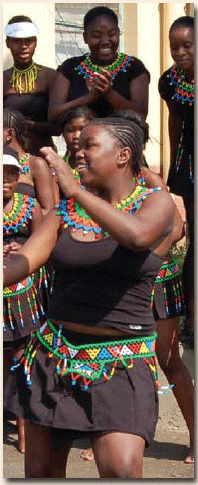
Tongaat Hulett continues to promote sustainable development through constructive Corporate Social Investment (CSI) initiatives, which are aimed at building and enhancing the quality of life of people, with emphasis on previously disadvantaged communities within which Tongaat Hulett operates. A well-entrenched CSI policy exists within the company, with guiding principles on key focus areas for social responsibility activities. CSI spend is mainly directed at education, health, community skills upliftment, charitable organisations, environmental needs and crime prevention.
The primary focus of CSI spend in 2008 was education, with a total spend of R4,6 million in this category. Key education projects included R1,8 million spent on labour training at Bridge City which will lead to economic development, community revitalisation and job creation. An amount of R1,8 million was used to donate lap desks to schools mainly in the rural areas and R393 000 was spent on bursaries. Other notable contributions in 2008 included a contribution of R444 000 to various health, welfare and community training programmes and R214 000 to the National Business Initiative. Community development programmes received R321 000 in sponsorship, while R106 000 was spent on environment, art and culture initiatives. All operations have Occupational Health Clinics that provide occupational and primary health care services at company expense.
In addition to the donation of funds to worthy projects, expertise is made available by company management to guide community projects. Where appropriate, CSI initiatives are linked with business objectives through a corporate social partnership approach, to ensure that the company’s involvement is in line with community priorities. The partnership activities at the property developments operation are an example of this approach. Mafambisse in Mozambique spent R615 000 towards community re-settlement with the objective of improving health, hygiene, provision of potable water and sanitation. In the South African operations, R1,8 million was spent on the provision of medical facilities and wellness programmes. The total CSI spend for 2008 including the cost of company sponsored occupational and primary health care services was R12 million. This was above the company’s commitment to allocate one percent of annual headline earnings to CSI on a company wide basis annually.
VALUE ADDED ANALYSIS
for the year ended 31 December 2008
| Rmillion | 2008 | 2007 |
| REVENUE | 7 106 | 6 395 |
| Bought-in materials and services | (4 968) | (4 670) |
| VALUE ADDED BY OPERATIONS | 2 138 | 1 725 |
| Dividends and other income | 287 | 337 |
| Capital profits | 71 | 48 |
| TOTAL VALUE ADDED | 2 496 | 2 110 |
| Applied as follows: | ||
| TO PAY EMPLOYEES | ||
| Salaries, wages and benefits | 1 002 | 929 |
| TO PAY PROVIDERS OF CAPITAL | 680 | 1 194 |
| Interest on borrowings | 325 | 193 |
| Distributions to shareholders | 355 | 1 001 |
| TAX | 212 | 288 |
| RE-INVESTED/(UTILISED) IN BUSINESS | 602 | (301) |
| Depreciation | 244 | 222 |
| Retained earnings after distribution to shareholders | 358 | (523) |
| 2 496 | 2 110 |
STAKEHOLDER ENGAGEMENT
Tongaat Hulett operates in an increasingly complex environment with multiple influences that can affect its ability to sustain commercial success. The company identified key stakeholders who play a crucial role in protecting and enhancing its reputation and value. Below is a comprehensive review of its key stakeholders, the reason for engaging them and how it is achieved.
Employees are engaged in order to attract and retain talent, improve competence and skills and enhance value and commitment. Staff are kept abreast of local and corporate business development via internal newsletters, company intranet, briefings and internal memos. The bi-annual results presentations are made available to staff by invitation and also through the company intranet.
Customers, suppliers and service providers are engaged in order to determine their needs, evaluate perceptions, enhance Tongaat Hulett’s brands, grow revenue and deliver new products. Each operating area has a marketing and procurement unit, which meets with customers, suppliers and service providers on an ongoing basis.
Tongaat Hulett engages with shareholders, investors, analysts and the media in order to create more accurate expectations, informed perceptions and market the business. Communication takes place through meetings with management, telephonic conversations, internet and email. A well entrenched investor relations team exists with a focus on communicating with all stakeholders and ensuring adherence to corporate disclosure requirements. In addition, annual and interim results presentations are held in Johannesburg, Cape Town and Durban in order to explain the company’s performance and prospects. Engagement with the media takes place on a formal as well as informal basis with media briefings, press releases, SENS announcements and publishing of relevant information on the Tongaat Hulett website. Shareholders are also encouraged to attend the company’s Annual General Meeting.
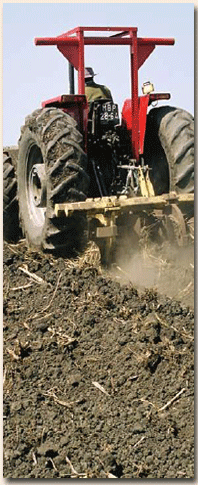
Government authorities and regulators are engaged in order to further optimise opportunities and assess issues relating to regulatory compliance. During 2008, the developments operation engaged extensively with the eThekwini and KwaDukuza municipalities, as well as the KwaZulu-Natal provincial authorities on key matters including affordable housing and appropriate urban development approaches. The starch and sugar operations engaged with the Department of Agriculture on agri-processing and land issues. The corporate office engaged with the Department of Labour regarding employment equity matters and transformation issues.
Managers in all our operations interact with trade unions on relevant employment issues with collective bargaining taking place where appropriate. The sugar and starch operations are the most labour intensive businesses and structures are in place to engage with various unions.
Local communities are engaged in order to develop a broader understanding of their concerns, align priorities and allocate corporate social investment in areas where there will be maximum impact. Community related programmes include enterprise development, socio-economic development, training, employment, environment protection, cultural heritage and support for recreation through community trusts.
FEEDBACK
All stakeholders are encouraged to share their views on this sustainability report with us, either by posted mail or email.
For further information, please contact:
Corporate Affairs
Tongaat Hulett
PO Box 3
Tongaat
4400
South Africa
Telephone: +27 32 439 4114
Email:info@tongaat.co.za




